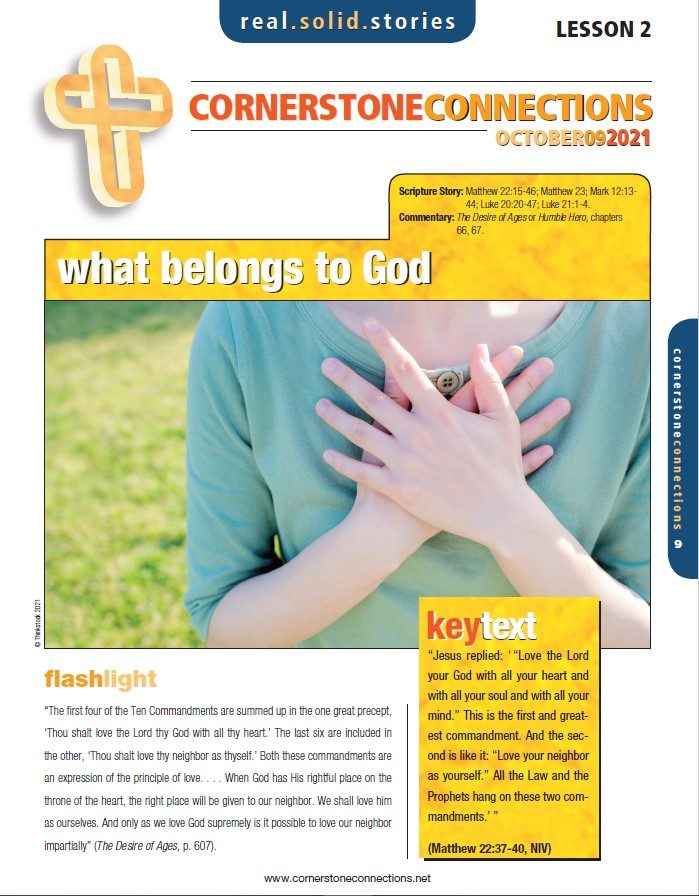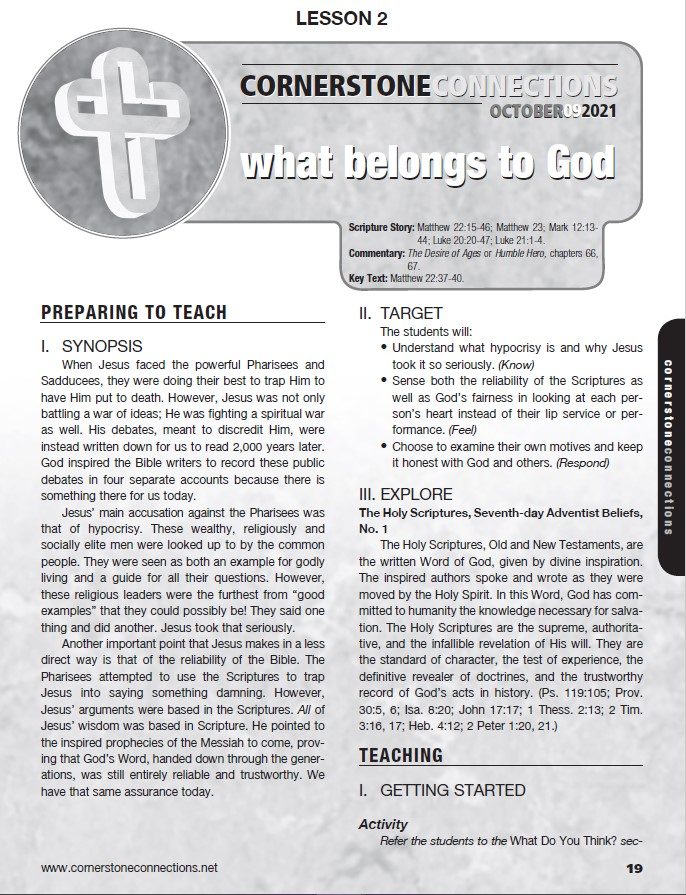Click below to download the Cornerstone Connections leader’s guide and student lesson. This week’s resources also include two lesson plans and a discussion starter video which offer different ways of looking at the topic. Each lesson plan includes opening activities, scripture passages, discussion questions, and real-life applications.
The religious leaders attempted to use Scripture to trap Jesus. However, all of Jesus’arguments were based on Scripture. He proved that God’s Word is reliable. An assurance that we can still have today.
Scripture Passages
OVERVIEW
Everyone has an agenda. Some people use their agenda for good and some for bad. Others have agendas that don’t make much difference in the world. What if your agenda was to do everything you could to convince others that your agenda was what was best for them even though you knew it to be harmful? Sound familiar? No, I am not talking about politics, vaccination status, or your favorite sports team. Instead, I am talking about how the religious leaders of Jesus’ day did everything they could to discredit Him and tear down His kingdom while attempting to build their own. In today’s lesson we will explore some stories that at first blush seem rather harmless, but the intent was much more sinister.

OPENING ACTIVITY:
PRAYER WALK
QUESTIONS
TRANSITION
Can you believe everything you read or watch on social media? Can you believe everything your pastor or teacher tells you? Every time someone opens their mouth to speak, their history shapes what they say, which is why it is important to know for yourself what the Bible has to say about life.

BIBLE STUDY GUIDE
Read Matthew 22:15-22.
15 Then the Pharisees went out and laid plans to trap him in his words. 16 They sent their disciples to him along with the Herodians. “Teacher,” they said, “we know that you are a man of integrity and that you teach the way of God in accordance with the truth. You aren’t swayed by others, because you pay no attention to who they are. 17 Tell us then, what is your opinion? Is it right to pay the imperial tax to Caesar or not?”
18 But Jesus, knowing their evil intent, said, “You hypocrites, why are you trying to trap me? 19 Show me the coin used for paying the tax.” They brought him a denarius, 20 and he asked them, “Whose image is this? And whose inscription?”
21 “Caesar’s,” they replied.
Then he said to them, “So give back to Caesar what is Caesar’s, and to God what is God’s.”
22 When they heard this, they were amazed. So they left him and went away.
QUESTIONS
Read Exodus 20:1-17.
1And God spoke all these words:
2 “I am the Lord your God, who brought you out of Egypt, out of the land of slavery.
3 “You shall have no other gods before me.
4 “You shall not make for yourself an image in the form of anything in heaven above or on the earth beneath or in the waters below. 5 You shall not bow down to them or worship them; for I, the Lord your God, am a jealous God, punishing the children for the sin of the parents to the third and fourth generation of those who hate me, 6 but showing love to a thousand generations of those who love me and keep my commandments.
7 “You shall not misuse the name of the Lord your God, for the Lord will not hold anyone guiltless who misuses his name.
8 “Remember the Sabbath day by keeping it holy. 9 Six days you shall labor and do all your work, 10 but the seventh day is a sabbath to the Lord your God. On it you shall not do any work, neither you, nor your son or daughter, nor your male or female servant, nor your animals, nor any foreigner residing in your towns. 11 For in six days the Lord made the heavens and the earth, the sea, and all that is in them, but he rested on the seventh day. Therefore the Lord blessed the Sabbath day and made it holy.
12 “Honor your father and your mother, so that you may live long in the land the Lord your God is giving you.
13 “You shall not murder.
14 “You shall not commit adultery.
15 “You shall not steal.
16 “You shall not give false testimony against your neighbor.
17 “You shall not covet your neighbor’s house. You shall not covet your neighbor’s wife, or his male or female servant, his ox or donkey, or anything that belongs to your neighbor.”
QUESTIONS
Read Matthew 22:34-40.
34 Hearing that Jesus had silenced the Sadducees, the Pharisees got together. 35 One of them, an expert in the law, tested him with this question: 36 “Teacher, which is the greatest commandment in the Law?”
37 Jesus replied: “ ‘Love the Lord your God with all your heart and with all your soul and with all your mind.’ 38 This is the first and greatest commandment. 39 And the second is like it: ‘Love your neighbor as yourself.’ 40 All the Law and the Prophets hang on these two commandments.”
QUESTIONS
Read Matthew 23:1-12.
1 Then Jesus said to the crowds and to his disciples: 2 “The teachers of the law and the Pharisees sit in Moses’ seat. 3 So you must be careful to do everything they tell you. But do not do what they do, for they do not practice what they preach. 4 They tie up heavy, cumbersome loads and put them on other people’s shoulders, but they themselves are not willing to lift a finger to move them.
5 “Everything they do is done for people to see: They make their phylacteries wide and the tassels on their garments long; 6 they love the place of honor at banquets and the most important seats in the synagogues; 7 they love to be greeted with respect in the marketplaces and to be called ‘Rabbi’ by others.
8 “But you are not to be called ‘Rabbi,’ for you have one Teacher, and you are all brothers. 9 And do not call anyone on earth ‘father,’ for you have one Father, and he is in heaven. 10 Nor are you to be called instructors, for you have one Instructor, the Messiah. 11 The greatest among you will be your servant. 12 For those who exalt themselves will be humbled, and those who humble themselves will be exalted.
QUESTIONS
Read Matthew 23:23-26.
23 “Woe to you, teachers of the law and Pharisees, you hypocrites! You give a tenth of your spices—mint, dill and cumin. But you have neglected the more important matters of the law—justice, mercy and faithfulness. You should have practiced the latter, without neglecting the former. 24 You blind guides! You strain out a gnat but swallow a camel.
25 “Woe to you, teachers of the law and Pharisees, you hypocrites! You clean the outside of the cup and dish, but inside they are full of greed and self-indulgence. 26 Blind Pharisee! First clean the inside of the cup and dish, and then the outside also will be clean.
QUESTIONS

APPLICATION
Jesus is very critical of the church leadership. Do you think they deserved it? Could the same criticisms be leveled at political leaders or any other groups today? Could Jesus be looking at you in the same manner? These passages of scripture weren’t saying that people in leadership are bad, but they are saying that with leadership comes the responsibility of representing Jesus in a way that draws people closer to Him instead of pushing them away.
Jesus spent most of His time with the people who weren’t considered important. Very seldom did pomp and circumstance accompany anything that He did. What would it be like if the majority of people in the world loved God with all their hearts and treated their neighbors in a way that represented the teachings of Jesus? What changes could you make to align your life with Jesus’ teachings?
FOLLOW UP
This week, walk around your neighborhood and make a list of people or places that need your prayers. Spend a few minutes each day praying for your list. After a few weeks of this, walk around your neighborhood again and see if anything is different. Keep doing it—you might just be able to change your corner of the world.

SCRIPTURE PASSAGE
Matthew 23:1-39
LEADER’S NOTE
For a Relational Bible Study (RBS) you’ll want to get into the Scripture passage and encourage the youth to imagine participating in the story while it’s happening. Then you will be able to better apply it to your own situation today.
You will need to ask God for the Holy Spirit to be present as your small group discusses the questions (no more than 3-6 people in a group is recommended). Start with the opening question. It is a personal question and the answer is unique for each individual. There is no right answer and nobody is an expert here, so don’t be surprised when you hear different responses. You are depending on the Holy Spirit to be present and to speak through your group. Say what God prompts you to say, and listen to what others share.
Take turns reading the chapter out loud. Follow that with giving the students some time to individually mark their responses to the questions (a PDF version of the handout is available as a download). This gives each person a starting point for responding when you start to share as a group. Next, begin the discussion by asking the students to share what they marked and why on each question as you work your way through. Feel free to take more time on some questions than others as discussion warrants.
Encourage each person in the group to apply what is discussed to their personal lives and to share with the group what they believe God wants them to do. Then ask them to pray that God will help each of them to follow through in doing so. Remind them to expect that God will show them ways to live out the message of this passage in the coming week, and that they are free to ask others in the group to help hold them accountable.
OVERVIEW
Throughout His 3½ year ministry, Jesus found the religious leaders trying to trap Him, attack Him, and even kill Him. His typical response was to leave. But as Jesus came to Jerusalem this last time before His death, He sought to engage this obstinate group of the religious leaders who were running the show at church (the temple). Matthew 22 includes multiple stories about how this played out—both for Jesus and those who were “out to get Him.”
Matthew 23 covers the most scathing rebuke Jesus gave the religious leaders. While He drove out the money changers in one quick sweep, His diatribe directly to the religious leaders pronounced judgment on them and exposed their hypocrisy. Our topic last week was hypocrisy. This week Jesus makes accusations of hypocrisy directly to the faces of the religious leaders, and He did it publicly.
If you were a religious leader, you would be deeply offended, and probably ready to strike back (which they did a few days later). If you were a follower of Jesus, you would cheer Him on, and then fear the repercussions that would soon come your way.
None of us would want to identify with the targets of Jesus’ harsh statements. Consider the source (Jesus) and the object (the hypocritical religious leaders). Instead of dismissing Matthew 23, pray and then ask yourself how this passage might relate to you.
You’re Going to Get It!
When have you given someone a “piece of your mind”?
Read Matthew 23:1-39.
1Then Jesus said to the crowds and to his disciples: 2 “The teachers of the law and the Pharisees sit in Moses’ seat. 3 So you must be careful to do everything they tell you. But do not do what they do, for they do not practice what they preach. 4 They tie up heavy, cumbersome loads and put them on other people’s shoulders, but they themselves are not willing to lift a finger to move them.
5 “Everything they do is done for people to see: They make their phylacteries wide and the tassels on their garments long; 6 they love the place of honor at banquets and the most important seats in the synagogues; 7 they love to be greeted with respect in the marketplaces and to be called ‘Rabbi’ by others.
8 “But you are not to be called ‘Rabbi,’ for you have one Teacher, and you are all brothers. 9 And do not call anyone on earth ‘father,’ for you have one Father, and he is in heaven. 10 Nor are you to be called instructors, for you have one Instructor, the Messiah. 11 The greatest among you will be your servant. 12 For those who exalt themselves will be humbled, and those who humble themselves will be exalted.
13 “Woe to you, teachers of the law and Pharisees, you hypocrites! You shut the door of the kingdom of heaven in people’s faces. You yourselves do not enter, nor will you let those enter who are trying to. [14]
15 “Woe to you, teachers of the law and Pharisees, you hypocrites! You travel over land and sea to win a single convert, and when you have succeeded, you make them twice as much a child of hell as you are.
16 “Woe to you, blind guides! You say, ‘If anyone swears by the temple, it means nothing; but anyone who swears by the gold of the temple is bound by that oath.’ 17 You blind fools! Which is greater: the gold, or the temple that makes the gold sacred? 18 You also say, ‘If anyone swears by the altar, it means nothing; but anyone who swears by the gift on the altar is bound by that oath.’ 19 You blind men! Which is greater: the gift, or the altar that makes the gift sacred?
20 Therefore, anyone who swears by the altar swears by it and by everything on it. 21 And anyone who swears by the temple swears by it and by the one who dwells in it. 22 And anyone who swears by heaven swears by God’s throne and by the one who sits on it.
23 “Woe to you, teachers of the law and Pharisees, you hypocrites! You give a tenth of your spices—mint, dill and cumin. But you have neglected the more important matters of the law—justice, mercy and faithfulness. You should have practiced the latter, without neglecting the former. 24 You blind guides! You strain out a gnat but swallow a camel.
25 “Woe to you, teachers of the law and Pharisees, you hypocrites! You clean the outside of the cup and dish, but inside they are full of greed and self-indulgence. 26 Blind Pharisee! First clean the inside of the cup and dish, and then the outside also will be clean.
27 “Woe to you, teachers of the law and Pharisees, you hypocrites! You are like whitewashed tombs, which look beautiful on the outside but on the inside are full of the bones of the dead and everything unclean. 28 In the same way, on the outside you appear to people as righteous but on the inside you are full of hypocrisy and wickedness.
29 “Woe to you, teachers of the law and Pharisees, you hypocrites! You build tombs for the prophets and decorate the graves of the righteous. 30 And you say, ‘If we had lived in the days of our ancestors, we would not have taken part with them in shedding the blood of the prophets.’ 31 So you testify against yourselves that you are the descendants of those who murdered the prophets. 32 Go ahead, then, and complete what your ancestors started!
33 “You snakes! You brood of vipers! How will you escape being condemned to hell? 34 Therefore I am sending you prophets and sages and teachers. Some of them you will kill and crucify; others you will flog in your synagogues and pursue from town to town. 35 And so upon you will come all the righteous blood that has been shed on earth, from the blood of righteous Abel to the blood of Zechariah son of Berekiah, whom you murdered between the temple and the altar. 36 Truly I tell you, all this will come on this generation.
37 “Jerusalem, Jerusalem, you who kill the prophets and stone those sent to you, how often I have longed to gather your children together, as a hen gathers her chicks under her wings, and you were not willing. 38 Look, your house is left to you desolate. 39 For I tell you, you will not see me again until you say, ‘Blessed is he who comes in the name of the Lord.’”
1. Who interprets the Bible for you?
2. Who are your religious role models?
3. What do you tithe?
4. Which of the “seven woes” Jesus gave in Matthew 23 do you identify with the most? Put a Ö by the top one(s) and a – by those that don’t apply to you. If it’s too personal, just leave it blank:
____ Verse 13: Keeping people out of the kingdom of heaven
____ Verse 15: Making converts worse than hypocritical religious leaders
____ Verse 16: Splitting hairs for one’s own advantage
____ Verse 23: Majoring in minors (and missing the majors)
____ Verse 25: Hypocrisy—Clean outside, but dirty inside
____ Verse 27: Hypocrisy—Parking outside; dead inside
____ Verse 29: Hypocrisy—Justifying the mistakes of your church
5. What did Jesus mean, “Your house is left to you desolate”?
6. From reading Matthew 23, what are your impressions of Jesus?
7. When/how do you at times act like a “mother hen”? When/how does Jesus gather you under His wings like a mother hen does her chicks?
8. What makes a person look spiritual on the outside? Be spiritual on the inside?
SUMMARY
After coming on strong in His condemnation of the religious leaders, Jesus closed with a heart-felt hope as He opened His heart regarding His desire to hold these hypocrites close, and to protect them. It’s like getting punished and then being offered a hug. Does love really call people to account? Only if you care would you try to stop or change the hypocrite. Only love would reach out with one’s own heart after calling someone on the carpet. Jesus did both. Tough love and tender love. Are you ready to receive both from Him?

APPLICATION
The application ideas below tap into the examples Jesus gave in Matthew 23. Choose one of these or come up with your own as you respond to the Holy Spirit’s conviction on your heart. You may want to start this at the end of Youth Sabbath School, and then continue it during the upcoming week.
Religion often gets a “bum rap” for being external rather than internal. You may prefer being “spiritual” by doing things on your own. But religion is simply spiritual practices that have had meaning for lots of people.
DOWNLOAD “RELIGIOUS THINGS I DO” HANDOUT
What’s important (major) to you? What’s not so important (minor) to you? Would God put these things in the same categories as you do?
DOWNLOAD “MAJOR OR MINOR” HANDOUT
This simple song has been around for a few decades, but the message continues to be vital for all humans. You can check it out on various sources. Just type in “Change My Heart O God.” One YouTube version that combines the song with a potter working the clay on a potter’s wheel can be found here:
https://youtu.be/fmSIoA6ilA8





